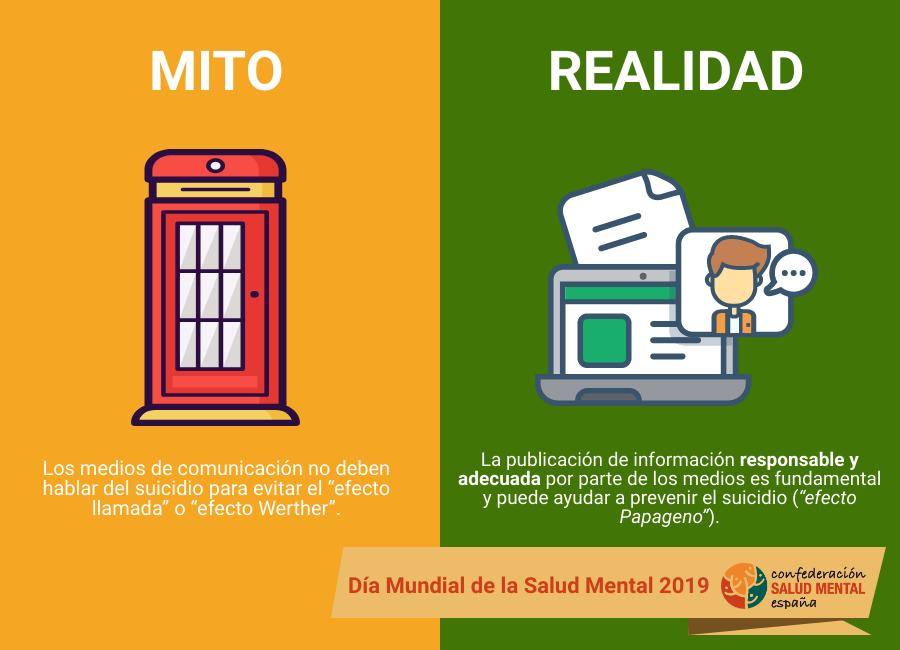Suicide: Is there really the so -called effect?Suicide: Is there really the so -called effect?
If the worst enemy of suicide could be drawn, it would take the form of silence.Throughout history there has been a veil of darkness that did not allow all those people who thought about ending their lives to end their suffering.
The taboo and the various myths that accompany suicidal behavior have meant - and continue to do it - an important barrier to their prevention.One of such erroneous beliefs is the idea that it is better to remain silent because of its possible infection effect.It's true?Not.Yes.It depends.Today, on the occasion of World Day against suicide prevention, we will respond to this issue.
The question is not whether or not to talk about the subject.There the answer will always be yes.Talking supposes comfort and rest.Inform properly exercises as a protection factor.
Here the key is how.Talking about suicide is not easy, it has never been.The suicide paralyzes the beat of the people who listen to their name and perhaps this is the reason for the mutism that it generates and the fears it awakens.
Currently, suicidal behavior is a world of public health.The figures already far exceed deaths due to traffic accidents or gender violence, but where is the space to talk about suicide?Where are the resources to stop this trend?In short, how do we do it?
Werther effect and papagen effect
The effect called or effect Werther takes its name from the novel The Penas of the Young Werther, published in 1774.In this book, the protagonist suffers so much for love that he decides to end his life.After their publication, numerous young people of the time decided to imitate the protagonist against the pain of unrequited love.
On the opposite side, there is the papagen effect.This character, from the magical flute of W.A.Mozart, abandons the idea of suicide when some children change their mind by reminding the possible alternatives to death.We observe two opposite effects when speaking or informing suicide.

The impact of the information should not be limited to the possible harmful effects that can be generated if done inappropriately.
Moreover, the media have (should!) A relevant role since they can act as an educational and protection factor.They do it when they announce the general population an understanding of the phenomenon in the mouth of experts.
Thus they facilitate an empathic attitude, demolishing the false idea that talking about suicide increases the possibility of happening and informing about existing resources and possible alternatives.
You can inform about people who contemplated suicide but managed to overcome with help.Or talk about how suicide ideas are not endless, thus offering hope and appropriate models.
Informative media can have a positive and preventive impact on people who are at risk whenever they are properly.Therefore, it is necessary to talk about suicide, but always, remember, properly.
How can suicide be addressed in the media?
There are numerous publications of this style to talk about suicide in the media.All of them emphasize that sensationalism or the romantic idea of death should be avoided to address suicidal behavior such as what it is: a complex phenomenon and a public health problem that demands collaborative work between all agents of society.Some guidelines are the following:
- Never talk about the method used.Scientific literature shows that there may be an effect called or a repetition of the method, especially if the deceased person is popular or famous.
- Do not glorify suicide.The person who committed suicide is someone who has not found, for the moment, a better solution to end their suffering.But it is not a good way to solve problems or a way to face them.It is a permanent solution for a situation and pain that, in the vast majority of cases, is a passenger.
- Avoid treating suicide unicuse, that is, by means of cause-effect simplifications.Suicidal behavior is complex and depends on many factors (psychological, social, ethical, cultural, biological, etc..).The sum of all of them is what increases the probability of carrying out suicidal behavior.
What should be done to report suicide?
First, it is advisable to expose alarm signals.Most people die from suicide or try to do so often give warning signs (express despair, testament, change routines and habits, consume alcohol and other drugs, etc..).Inform the general population about them allows you to act early.
On the other hand, it is necessary to report suicide as a health problem.It is important to talk about the available resources that allow offering a space for help to those people who can find themselves in a similar situation (call a line of crisis or 112, go to mental health services, ask for help from anearby person, etc..).
The positive value of the support of friends, family and other people must also be shown.It is difficult to ask for help or know that there is no place or time to talk about that suffering.Faced with the harassment of suicide ideas we are not alone, there are other alternatives, other resources, other solutions.
Scientific evidence shows that the media have a great power to sensitize and inform the existing protection factors.
Suicide is preventable and is everyone's problem.Breaking silence is somewhat essential.For this, information, training, awareness and awareness of the different members of society are necessary.
Talking about suicide correctly allows you to give voice to those who need it most and, above all, to make known that they are not alone, that there are alternatives and resources, that there is life beyond that they still cannot see.
This article was originally published in The Conversation.Read the original.









2143